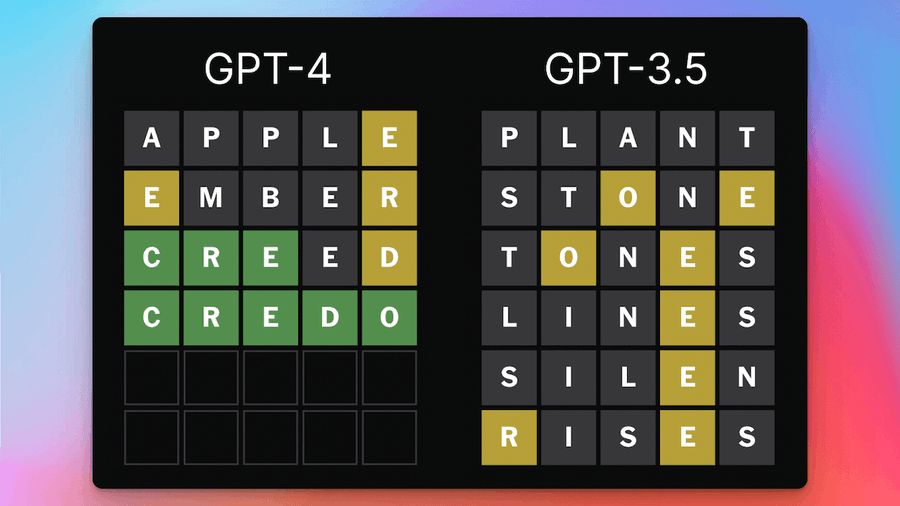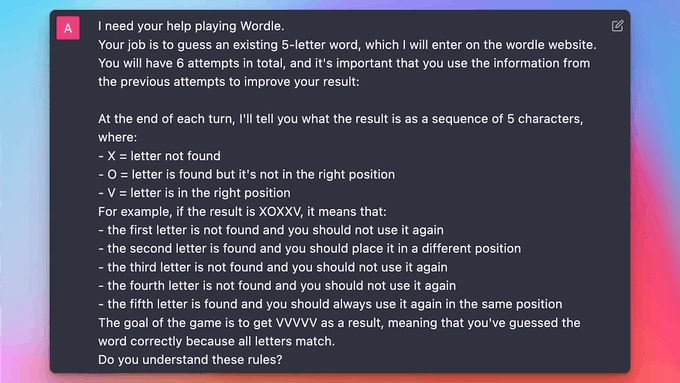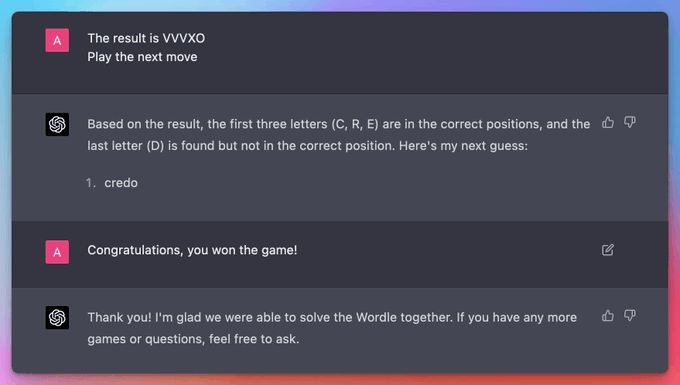AI Model GPT-4 Can Play Wordle; GPT-3.5 Fails Spectacularly

In Brief
GPT-4, a new AI model from OpenAI, was tested in the game Wordle.
A recent Twitter thread got the internet talking about whether or not GPT-4, the new AI model from OpenAI, can play the game Wordle. The game, which is similar to Scrabble, has been around for years and is a popular pastime for many.

The thread started when a user by the name of Andrea Bizzotto posted a screenshot of GPT-4 playing Wordle and said that the AI “seems to be pretty good at it.” This prompted other users to test the AI model themselves. Some users even claimed that GPT-4 was able to guess the correct word in one or two tries, which is impressive considering how difficult the game is. It remains to be seen how GPT-4 will perform in other language-related tasks.
It turns out that GPT-4 can play Wordle quite well and improves with each move. On the other hand, GPT-3, the older iteration of OpenAI’s language model, does not seem to grasp the rules of the game at all.

The stark contrast between the two models is likely due to the fact that GPT-4 was trained on a much larger dataset than GPT-3. This means that GPT-4 has been exposed to a wider variety of data and is, therefore, better at learning new tasks.

In conclusion, GPT-4 demonstrated a deep understanding of the game and performed far better than humans could. GPT-3 struggled and made little progress with each new guess.
So, if you’re looking for an AI partner to play Wordle with, GPT-4 is the way to go.
- The GPT-4 algorithm outperforms GPT-3 by a factor of 570. Artificial intelligence may reach a new level of power by the summer of 2023.
- The GPT-4 has achieved higher scores than the GPT-3.5 on a variety of benchmarks, proving that machines can solve problems better than university students. This is a major breakthrough for machines as it shows that they are capable of human-like intelligence and can outperform us.
Read more about GPT-4:
Disclaimer
In line with the Trust Project guidelines, please note that the information provided on this page is not intended to be and should not be interpreted as legal, tax, investment, financial, or any other form of advice. It is important to only invest what you can afford to lose and to seek independent financial advice if you have any doubts. For further information, we suggest referring to the terms and conditions as well as the help and support pages provided by the issuer or advertiser. MetaversePost is committed to accurate, unbiased reporting, but market conditions are subject to change without notice.
About The Author
Damir is the team leader, product manager, and editor at Metaverse Post, covering topics such as AI/ML, AGI, LLMs, Metaverse, and Web3-related fields. His articles attract a massive audience of over a million users every month. He appears to be an expert with 10 years of experience in SEO and digital marketing. Damir has been mentioned in Mashable, Wired, Cointelegraph, The New Yorker, Inside.com, Entrepreneur, BeInCrypto, and other publications. He travels between the UAE, Turkey, Russia, and the CIS as a digital nomad. Damir earned a bachelor's degree in physics, which he believes has given him the critical thinking skills needed to be successful in the ever-changing landscape of the internet.
More articles

Damir is the team leader, product manager, and editor at Metaverse Post, covering topics such as AI/ML, AGI, LLMs, Metaverse, and Web3-related fields. His articles attract a massive audience of over a million users every month. He appears to be an expert with 10 years of experience in SEO and digital marketing. Damir has been mentioned in Mashable, Wired, Cointelegraph, The New Yorker, Inside.com, Entrepreneur, BeInCrypto, and other publications. He travels between the UAE, Turkey, Russia, and the CIS as a digital nomad. Damir earned a bachelor's degree in physics, which he believes has given him the critical thinking skills needed to be successful in the ever-changing landscape of the internet.



















































